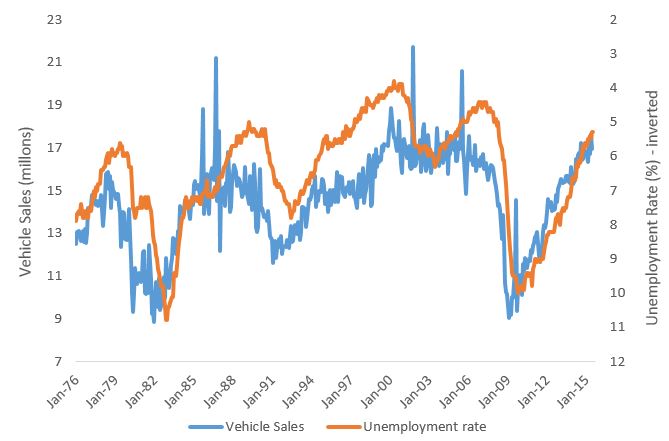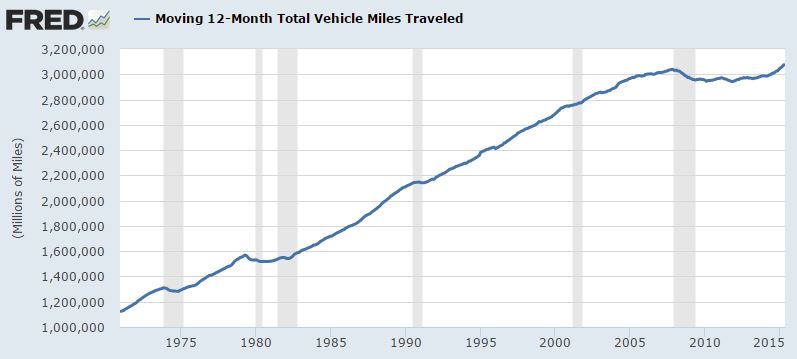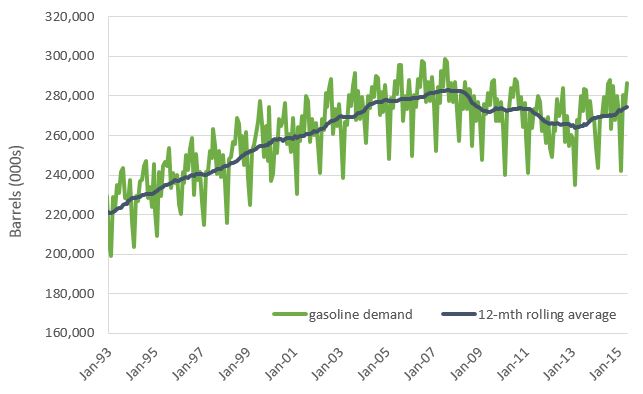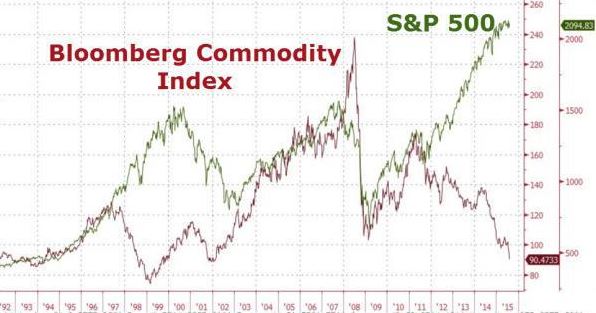Part of life is accepting your shortcomings, and trying to move beyond them. For example, I have had to come to terms with the fact I will never be able to dunk, or write 'citizen' without questioning its spelling. (Every single time). When it comes to trading, there is a limitation known as cognitive dissonance, where you may hold a certain opinion about a market, despite evidence telling you something to the contrary.
The potential for higher interest rates in the coming months underscores why we need to be vigilant about how certain events can impact energy, even if they seem unlikely, uncertain, or disconnected. So via the unemployment rate, here is a winding path back to energy which highlights the need to be aware of cognitive dissonance, and to keep an open mind.
In the July jobs report, the unemployment rate held at 5.3% - the lowest level in seven years. This has a bearing on vehicle sales, as there is a strong relationship betwixt it and unemployment. This makes logical sense, given the necessity of a car to drive to work for a good chunk of the population.
Inverting the unemployment rate, we can see how the lowest ebb of vehicle sales is a leading indicator for the peak of unemployment. What is less intuitive is how the peak of vehicle sales seems to signal a rebound in the unemployment rate; as we see vehicle sales topping out, we should be vigilant for a turn in the unemployment rate also.

From vehicle sales we move onto vehicle miles traveled, and how they seemingly peaked in the US just prior to the great recession (an ironic term, I know), as higher gasoline prices combined with a cratering economy to steer people off the roads.
A second one-two punch combo came in the form of changing US demographics as it meant a change in driving behavior: an aging population meant more older people on the roads (who drive less miles), while the younger folk chose not to buy a car (for financial reasons, or location - living an urban lifestyle and using public transport).
As we left the great recession in the rear-view mirror, a combination of new factors also appeared to be contributing to lesser miles driven - from telecommuting to online shopping. But as we accelerate through the middle of the decade, a modest economic recovery combined with a considerable drop in gasoline prices have finally encouraged a return to hitting the gas. What seemed like a turning point eight years ago, now turns out to be just a previous high: vehicle miles traveled are now at a new record:

For this record to be achieved, it makes logical sense that gasoline demand would have to respond also.......and it has. Although it too went through a multi-year slow-motion troughing, it is now marching higher, further boosted by retail gasoline prices spending much of this year ~$1/gallon below what they were in 2014.

But here we return to my inability to dunk. It makes sense that vehicle sales are strong given the backdrop of low unemployment. It also makes sense that both gasoline demand and vehicle miles traveled are increasing, despite the changing demographics of the US.
But we face a number of cross-currents in the coming months, which will strongly influence energy. While a backdrop of rising interest rates indicates an improving economy, strength to the dollar could put further downward pressure on commodities. Rising interest rates could also hit vehicle sales as borrowing costs rise, while a negative reaction by broader markets such as equity markets could cause havoc.
Convention tells us that rising interest rates should make the US dollar a more attractive destination, pressuring commodities lower, while at the same time it could negatively impact US company earnings, and ergo, their stock prices. We have seen periods in the last few decades where equities and commodities have been both positively and negatively correlated. At this juncture, we see commodities at multi-year lows and equities at multi-year highs:

This leaves us in a time of great uncertainty. While both the equity rally and the commodity sell-off appear overdone, logic dictates that these trends could well continue in the face of an improving economy and rising interest rates.
But at the risk of ignoring cognitive dissonance, financial markets also seem ripe for a counterintuitive move, as indicators reach extremes: commodities could rebound amid a correction in equities.
Either scenario remains a possibility. The key thing is to remain open-minded and vigilant, for no result at this juncture seems a slam dunk.
